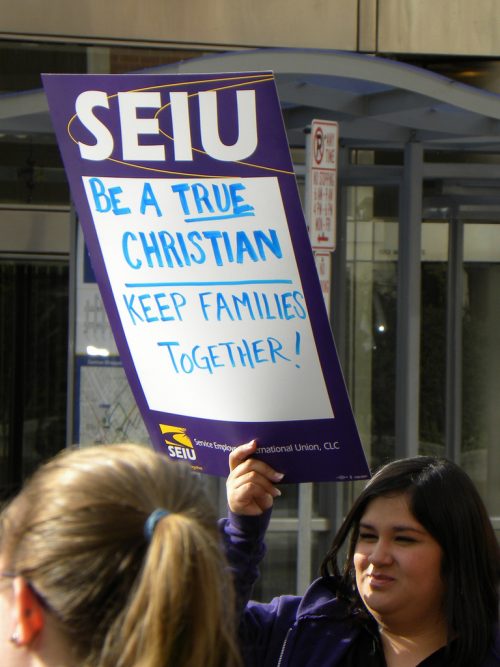By now, you’ve probably heard about the family separation and detention policies at the U.S. border. The facts are horrifying.
Recent media coverage has led to a flurry of outrage and debate about the origins of this policy. It is a lot to take in, but this case also got me thinking about an important lesson from sociology for following politics in 2018: we’re not powerless in the face of “fake news.”

Political sociologists talk a lot about framing—the way movements and leaders select different interpretations of an issue to define and promote their position. Frames are powerful interpretive tools, and sociologists have shown how framing matters for everything from welfare reform and nuclear power advocacy to pro-life and labor movements.
One of the big assumptions in framing theory is that leaders coordinate. There might be competition to establish a message at first, but actors on the same side have to get together fairly quickly to present a clean, easy to understand “package” of ideas to people in order to make political change.
The trick is that it is easy to get cynical about framing, to think that only powerful people get to define the terms of debate. We assume that a slick, well-funded media campaign will win out, and any counter-frames will get pushed to the side. But the recent uproar over boarder separation policies shows how framing can be a very messy process. Over just a few days, these are a few of the frames coming from administration officials and border authorities:
- We don’t have a border separation policy
- We had to do something, and it’s the Democrats’ fault
- We have to enforce the “law,” it’s biblical
- Those things that look like cages aren’t really cages
- Ok, we’d just rather you not use the word “cage”
No, these aren’t cages, @SteveDoocy says. The authorities simply “built walls out of chain-link fences.” Yes, that’s a real quote from Fox just now. pic.twitter.com/7oVQ6oE85x
— Brian Stelter (@brianstelter) June 18, 2018
We don’t know how this issue is going to turn out, but many of these frames have been met with skepticism, more outrage, and plenty of counter-evidence. Calling out these frames alone is not enough; it will take mobilization, activism, lobbying, and legislation to change these policies. Nevertheless, this is an important reminder that framing is a social process, and, especially in an age of social media, it is easier than ever to disrupt a political narrative before it has the chance to get organized.
Evan Stewart is an assistant professor of sociology at University of Massachusetts Boston. You can follow his work at his website, on Twitter, or on BlueSky.
Comments 4
Jason Boo — December 9, 2019
BlaBlaBla
Ann P. Freeman — December 28, 2021
When choosing to live in a city, many people are tempted by the excitement of everything that is available at their fingertips. Wireless internet access brings all of this into the home without having to deal with cables. Wireless internet allows for users to connect to the web from any location within range - allowing them to stay connected while watching TV, reading emails but now it's easy to write my research paper for me which users can visit at https://studyclerk.com/ site for quality work. Thank you!
gyoumerst — May 29, 2024
Uno Game offers a convenient way to enjoy the classic Uno gameplay anytime, anywhere, with online competition.
Jackson Mia — June 1, 2024
Each of our names is very meaningful, we can use names to quickly check the love compatibility between you and that person using a love tester. The results are fun and entertaining.